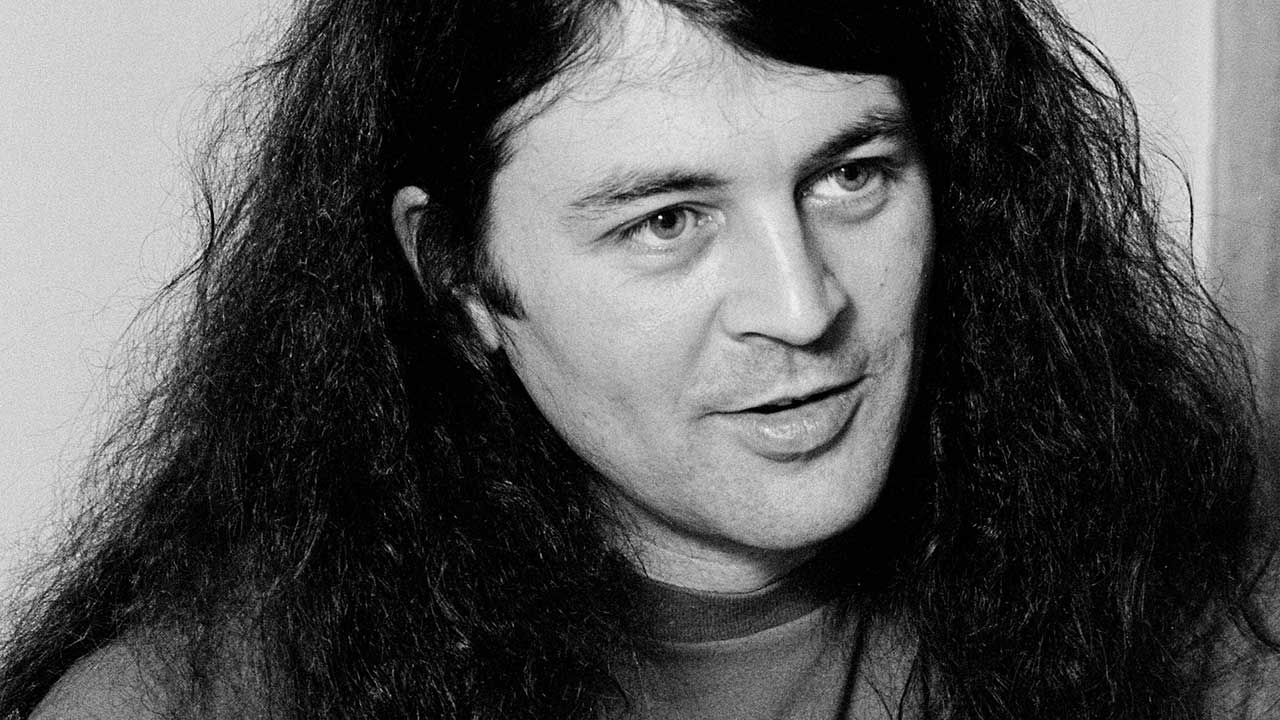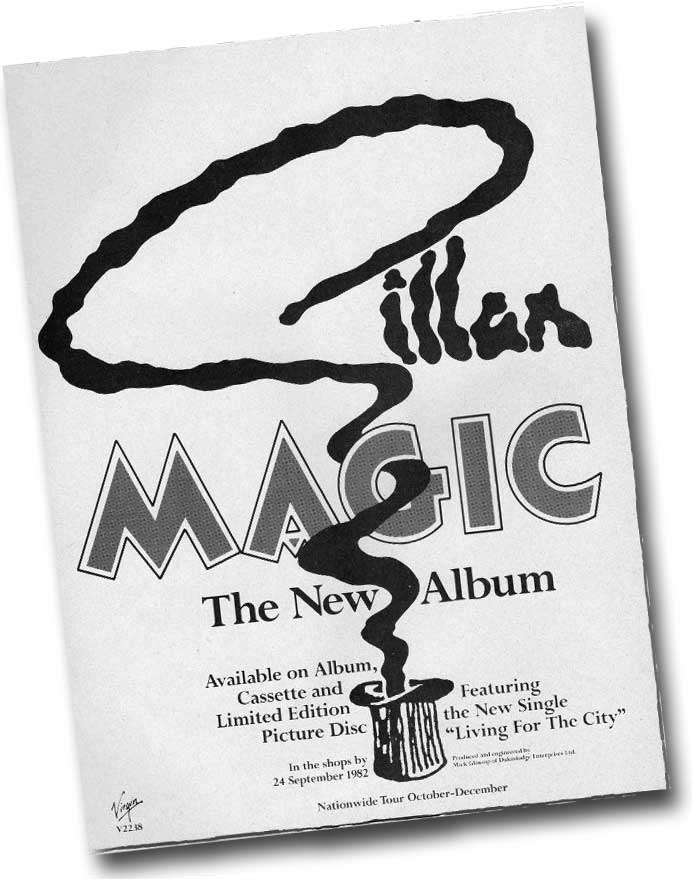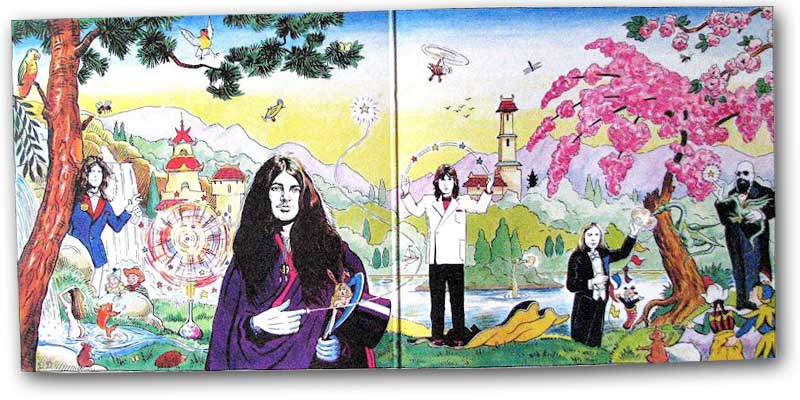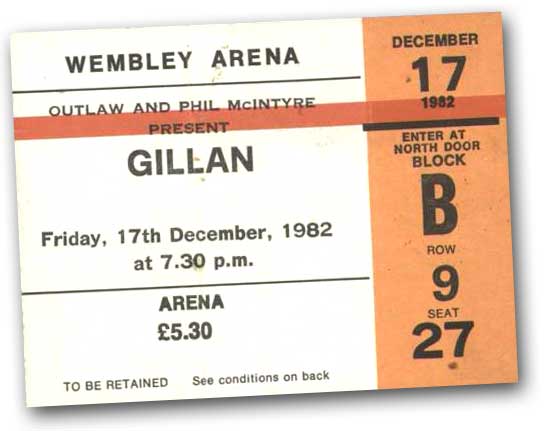Was Gillan's Magic a hidden concept album about the end of the band?
Gillan's final album was their most musically daring... and it may have contained a series of veiled messages about the band's future

Select the newsletters you’d like to receive. Then, add your email to sign up.
You are now subscribed
Your newsletter sign-up was successful
Want to add more newsletters?
Of the three major offshoots that emerged after the break-up of Deep Purple in 1976, Gillan (the band, not the man) was certainly the most musically daring. And Gillan’s most daring album just might be their last: 1982’s Magic.
Yes, the keyboard-heavy record carries a glossy, polished sheen; yes, it contains a pair of obvious stabs into ‘hit single’ territory; and yes, the off-the-rails kinetic chemistry of the Bernie Torme years is largely absent. But it’s not the music that makes makes Magic Gillan’s most fascinating record; it’s the words.
Truth be told, Magic could and should be looked at in hindsight as a concept album, as the lyrics throughout revolve around a common theme: Gillan (the man, not the band) was laying out his future plans right before our very eyes, misdirecting our attention with another album’s worth of musical hocus pocus while planning the greatest magic trick of all: making himself disappear.
Some context: After leaving Deep Purple in June of 1973, Ian Gillan spent a few years away from the music biz, eventually launching The Ian Gillan Band, who released three albums of what can only be called jazz-rock, to limited success.
Gillan scrapped the IGB but retained keyboardist Colin Towns, whom the vocalist regarded as a valuable writing partner. The pair re-emerged in 1978 with a new band, re-christened simply ‘Gillan’, and a self-titled album, released only in Japan.
Perhaps sensing the coming NWOBHM, Gillan, Towns and bassist John McCoy revamped the band’s line-up to include guitarist Bernie Torme and drummer Mick Underwood, heading in a much harder-rocking direction.
This bunch released three UK Top Twenty albums (including a #2 & #3) before Torme left; enter Janick Gers, and two more UK Top Twenty records. Add to that six UK Top Forty singles, and you’ve got one heckuva four-year run.
Sign up below to get the latest from Classic Rock, plus exclusive special offers, direct to your inbox!
In Britain, during the NWOBHM, Deep Purple’s offspring: Gillan, Whitesnake and Rainbow, dominated the UK Heavy Rock scene. But the first whispers of a Deep Purple Mk II reunion began to circulate in early 1982, as the NWOBHM fire began to fade, and probably caused the five members of Deep Purple’s classic line-up to pause and reassess.
Ritchie Blackmore seemed content, having found his pot of gold at the American end of his Rainbow, and bassist Roger Glover was a key factor in the band’s US success. Whitesnake, which then included Jon Lord and Ian Paice, were on the verge of implosion, as David Coverdale began retooling the band in an attempt to replicate Rainbow’s success in the US.
Paice bolted; Lord stayed. Gillan’s response to the MK II reunion rumours was hidden in plain sight: within the lyrics of what would be his namesake band’s final album, Magic.
Note: most of the audio embeds in the feature are not available in North America. Sorry about that.

A quick look at the track listing reveals a lot: Titles like Caught In A Trap, Long Gone, Living A Lie imply a theme; non-album tracks used as b-sides and giveaways such as Breaking Chains and Purple Sky continue that theme.
Even on the surface, we find an indication as to where Gillan’s mind was at during the process of putting together the Magic album. Delving deeper, and looking at the lyrics to these songs, and several others on the album, allows an even deeper insight. The concepts Ian Gillan was working with here centre around themes of entrapment, escape, and rebirth… as well as deceit.
The lyrics on Magic paint a picture of one trapped in an undesirable circumstance, while covertly working toward a more favourable situation. Which is pretty much exactly what occurred while Gillan manoeuvred himself into position for a Deep Purple reunion.
Magic’s lyrics contain ample evidence that, by the time that the lyricist put pen to paper, Ian Gillan had already made his mind up to end the band. Of the twelve original tracks recorded (several covers were also recorded, though only one made the album), eight of them contain hints and clues about Gillan’s mindset and the band’s imminent demise.
Some of these red flags are woven into the material with great subtlety; others are startlingly direct. These weren’t just lyrics; they were a letter of resignation. Gillan’s work on Magic is akin to a that of a master criminal who intentionally litters his crime scene with tantalising clues and dares us to put the pieces together, before it’s too late… Or how about Gillan the Escape Artist; stunning his audience by extricating himself from certain doom with seconds to spare, through mystifying means that could only be described as ‘Magic’.

Entrapment/Escape, Rebirth
Some additional context: After a few albums and an extensive amount of touring, the members of Gillan became concerned at their lack of financial success (see: Bernie Torme’s exit), and Ian himself has stated that the band were badly in debt by 1982.
Gillan had financed the band entirely with his own money, and by around this time, the Gillan band was deeply in debt. A reunion of the classic Purple line-up just might do the trick…
This snippet from the b-side Breaking Chains contains several hints of Gillan’s financial woes:
Ten years of hard sweat, I’m sitting here with a mess of bad debt
I’m down, flat broke, sitting here and you know it’s no joke
I ain’t tired, I ain’t dead, going crazy getting out of my bed, here we go, got another show
Hot dog, cool bitch, feels good but you will not get rich, here we go, got another show
Breaking Chains also speaks to Gillan’s imminent freedom:
How can I be so sad? I gave everything I had
Now that I’m free again, I’m strong and I’m breaking chains
Here’s the dream that I’ve been searching for, I know ’cause I’ve been here before
‘Here’s the dream – I’ve been here before’ is a reference to his previous tenure in Deep Purple and the potential upcoming reunion.
Long Gone has many surprisingly overt references to Gillan’s as-yet-unknown decision to end the band. Musically, this song was an obvious choice for one of the album’s singles, although with these lyrics on top, the choice was a bold one; here IG unflinchingly reveals that his decision is made: He’s gone, long gone:
Say what you’re going to say. I’ll never turn you away but you’ll never make me stay
I’ll come back when the trees stop growing, I’ll come back when the tide stops flowing
I’ll look around when there’s no complaining, I will not return
Send love to the old ways, love to the city haze, I’m gone, long gone
The album’s magnum opus, Demon Driver, contains the following:
I’m trapped here in this tomb, Hell fire here in this womb, this earth
Demon Driver also includes many uptempo sections that utilise the concept of driving as a metaphor for escape:
Goodbye habit, boring Sunday, Monday slow death
Hello freedom, faster freeways, clean air sweet breath
The album outtake Purple Sky is another hidden-in-plain-sight clue about Gillan’s future plans. The was kept off the album, and was not used as a b-side, but rather it was relegated to a flexi-disc and given away free with the purchase of an issue of Flexipop magazine.
This excellent song would have been a stellar addition to the album’s track list, but perhaps the title/chorus was too much of a giveaway? The song opens with the line:
‘My old lady, have a lot of fun, when she look the other way, I begin to run’
The first proper verse leads right into the chorus like this:
When I’m cruising you know I’m confusing my head
When I’m choosing there’s no one that I want instead
Purple sky, get me by, purple sky get me high, get me high, free and high, purple sky
Deceit
Gillan began work on the Magic album in July of 1982, and the album/tour cycle lasted until the band’s final performance in December; Gillan’s lyrics had to have been completed during the July/August recording sessions, at the very latest.
That means that Ian Gillan kept his plans to end the band a secret for six whole months…
Bluesy Blue Sea is about a man about to embark on a journey, as he prays to the sea that he will get to his destination. He suspects that his departure will upset those he left behind who are as yet unaware of his decision, but feels he must stay true to himself despite the fallout and hopes that they will understand the reasons behind his leaving:
Sitting here with the bottom line, you wanna know what, I’m gonna take my time
It may be good but it could be bad it drives me mad
Looking deep in my moody eyes, feeling good well I got a big surprise
Lock me up if I’ve done you wrong, you’ll never sing my song
Got a dream in December days, I can’t reach it but I’m gonna change my ways
Forget the wind and forget the now, you gotta let me go
Sitting here like a lunatic, you wanna know what and don’t it make you sick
Yes I may be right I may be wrong, but you can’t sing my song
Bluesy Blue Sea won’t you favour me
In Driving Me Wild, Gillan outlines another reason he had privately decided to move on:
What can you do when you stay is your soft and easy life, when ambition is burning to make a break?
What can I do? Lost in a haze, telling you how but I’m just in a daze
That ‘telling you how‘ bit could be seen as a bold admission that the truth is here if one cares to look.
Long Gone offers more hints at the covert nature of Gillan’s decision throughout the creative process of the album, in the two cryptic instances of ‘it’s not what you think’:
Long gone, out of this place, long gone, it’s not what you think
Long gone, don’t want a new face, long gone it’s not what you think
Living a Lie appears on the surface to be about a person who has fallen out of love with their partner, yet remains in the unhealthy relationship. In the context of the rest of the lyrics on the album, it’s all too easy to understand that Gillan is actually relating his feelings about his relationship with his band. The middle eight section reads as follows:
Going down going down, down to deceive, coming round, around I believe
Lay me down, lay me down I can’t breathe, I’m living a lie
This line is sung three different times in the song over a solemn, church like organ riff, and is quite striking in its stark declaration:
It’s just another lie
The song ends with this line, softly spoken and drenched with reverb, over the same quietly somber organ backing… feeling more like a confession than a song lyric.
And finally, Demon Driver, includes this ominous admission:
Look past my eyes, you’ll be surprised
Inside this civilised master, there lies a human disaster
Gillan dissolved Gillan the band at the end of the Magic tour, after their final gig at Wembley Arena on December 17, 1982, exactly as foreshadowed in Bluesy Blue Sea with that ‘Got a dream in December days’ lyric.
Clearly Ian Gillan had the band’s demise planned right down to the month of the final gig. Claiming the need for throat surgery, Gillan was now free for the Deep Purple Mk II reunion… which was scuttled by Ritchie Blackmore, who opted to one more album/tour cycle with Rainbow.
Gillan now had a year to kill, and so less than two months after his namesake band’s final gig, he was announced as the new lead vocalist of Black Sabbath. The quick turnaround was a shock to the other members of Gillan, leading them to believe they had been *ahem*, misled about the reasons for Gillan’s ending the band.
The Sabbath detour turned out to be a one-off, as the fabled Mk II reunion finally became a reality in April of 1984.

The remaining members of Gillan were all quite vocal about their perceived betrayal, expressing their acrimony in the UK music press as well as in songs written about their ex-bandleader’s behaviors and motivations.
To hear the band’s impressions of what took place, without the lyrical sleight of hand employed by their former boss, check out John McCoy’s ‘Because You Lied’, a direct response that pulls no punches; McCoy felt so close to the singer that he named Gillan godfather to his first daughter.
Colin Towns gave How Does the Cold Wind Cry to Roger Daltrey, who recorded the song for his Parting Should be Painless collection, a loose concept album inspired by the break-up of The Who. Towns’ song fit into Daltrey’s theme seamlessly; the lyric is a sad and haunting take on his betrayal by someone he had loved and trusted for almost a decade.
So Gillan the Magnificent pulled off quite an amazing trick with ‘Magic’, turning Gillan’s fifth record into a concept album about his breaking up the band right before our eyes… and right under his band’s noses. In retrospect, this is the same guy who wrote a very unflattering lyric about Ritchie Blackmore over a song on Deep Purple’s Who Do We Think We Are? LP (Smooth Dancer) which went wholly unnoticed by the Man in Black, so his Magic-al mischief was not without precedent.
One wonders if any of the former members of Gillan ever had had an inkling of what was happening, after hearing those lyrics night after night on the road, or perhaps a head-smacking moment years later— “Of course! How could I not have seen it!” But by then, The Amazing Gillan had packed up his travelling Magic show and moved on to Purpler Skies and greener pastures…
This feature was originally published at MayoNoise.
Bob Mayo is not the Bob Mayo who played with Peter Frampton. But he was in Boston heavy metal band Wargasm from 1985 to 1995. They released three albums and one EP (all of which are now sadly out-of-print), had a video on MTV, toured Europe three times and select parts of the US twice, and had a great time doing it. He also recorded two albums under the fictitious band name Robot Monster Army.
